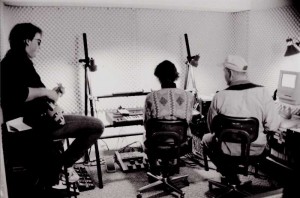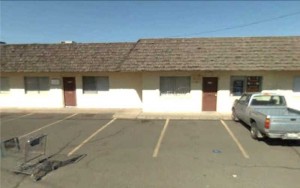taking care of business
funny, music, recording, Yakima No Comments »I always knew that I wanted to be a professional musician.
I grew up in a remote, small town in the middle of nowhere, however, which meant that opportunities for music careers were limited at best, if not completely nonexistent, and that there were no links to the music industry—or any other industry save agriculture—in that little town. I knew that I didn’t want to be a classical pianist or a jazz bassist (both of which I studied), or a teacher of either piano or guitar. I knew that I was much too geeky-looking to be any kind of rock star or celebrity, but I figured that at if I could at least play guitar well enough, I might gain some sort of notoriety or interest that way.
All that didn’t stop me from dreaming, however, or from honing my musical skills, because even back in the day, you’d always hear stories about these so-called ‘talent scouts’ who comb the country looking for the Next Big Thing. Never mind that my little town was so far off the map—thousands of miles from anywhere—and that talent scouts pretty much stick to the four or five biggest cities in the country; I had no concept of any of that, so I thought in my early teenage heart of hearts that if I could play well enough, and if I had a good enough musical reputation, word would spread and somehow get back to those scouts, as if they could show up in a random little town in rural Washington state and say, “Who’s the good guitarist here?”
I was in a couple of bands, and when it was time to record some of our songs, I was lucky enough to choose a studio that was run by a guy who’d moved up from AngelCity, and still had some connections there. He was (or at least he claimed to be) friends with Lenny Kravitz and Lisa Bonet, so he seemed like a good person to know. And he was, I guess. He turned out to be a pretty weird dude, and I’ve told a few longish but interesting stories about him already (here, here, and here), so I’ll gloss over him for now.
I figured being a studio musician for hire could be a good and interesting way to get noticed and to connect with people, so I worked with Enigma (not Enigma Records, but my blog pseudonym for the studio owner) and did whatever was necessary. I played guitar, bass, keyboards, and played the drum machine. I worked with a group that Enigma had put together that was inspired by the New Kids on the Block, and the two of us collaborated on writing songs for a group of three teenage Hispanic girls who couldn’t carry a tune in a bucket, but who were attractive enough that Enigma felt like they’d have a certain appeal. All of these projects went nowhere, naturally. Funnily enough, I do still have a couple or three cassettes of some of my sessions from back then in a box somewhere. They always turn up when I least expect them.
I had read enough guitar player magazines to know that versatility was the name of the game in the recording studio, and I felt like I always had to be on my game, capable of doing anything, in case one of those shadowy and elusive scouts happened to show up in town, looking for Talent. I befriended the major studio owners in town (of which there were about two or three), and let them know that I was interested in working on recording sessions, regardless of the musical style. Occasionally, people I had worked with mention me to studio owners when they needed a guitarist or something, which I always appreciated, and usually jumped at the chance to do whatever they’d recommended me for.
My favorite of the recommended gigs was when one of my friends called me and said, “Hey, I know a guy who’s going into the studio to do a demo. It’s kind of 1950’s style music. You’ll like it.”
“Cool,” I said, “sounds good. Where and when? And does it pay?”
“Yeah. He doesn’t have a lot of money, but it pays.”  He told me which studio at which it was happening, and when, and I thanked him and told him I’d be there.
My roommate at the time was (and still is) a musician as well, so occasionally, I used to invite him to come with me to things. I said he could come if he drove me over there, because then he’d have an excuse to stick around without any of the studio guys raising an eyebrow.
So when the day came, we drove into the studio’s parking lot and saw an Elvis impersonator leaning against his slightly battered but still cool red convertible, talking to an older guy. My friend used to tease me for some of the sessions I played on, and he liked to call me a ‘musical whore.’ He couldn’t resist needling me as we saw the pseudo-Elvis. “Man, you are way more than a regular whore. You’re a gay whore. You’re taking it in the ass on this one.”
I laughed and told him to shut up as we parked and walked over to meet Elvis, whose real named turned out to be Steve. He introduced us to the older guy next to him, who was his manager. I shook his hand and successfully resisted the temptation to say, “Colonel Tom; nice to meet you.” [FYI, Colonel Tom Parker was the REAL Elvis’s manager for his entire career.] We all walked into the studio together, and set about the task at hand.
The song he’d brought in to work on was called “Jukebox Fever”, which was an oldie that sounded like Johnny B. Goode, only sung like Elvis Presley. I ended up playing drums, bass, and electric guitar on it, and spent all afternoon doing that. I remember that the drums weren’t actual drums, but Space Muffins, which were a weird electronic hybrid trigger system thingy that attached over a regular drum kit and made it sound electronic. It was a stupid idea for many reasons, in retrospect, but it was the early 1990’s (in other words, just BARELY out of the 80’s), and that kind of thing was still considered viable at the time. But that’s not the point of this story.
The point is that once I was done playing everything, it was time for Steve/Elvis to do his thing, and I’m here to tell you that he totally ruled. Everyone in the room, with the exception of Colonel Tom, had no idea what to expect from the guy, but he delivered the goods on that day. Our jaws dropped, and we were completely impressed with him. Suddenly, I didn’t feel like a ‘gay whore’ anymore, I was proud to have worked on this project. IF ONLY I HAD A CASSETTE COPY OF THAT RECORDING. Oh, how I wish I could hear it again. Truth be told, I’d probably cringe at it, after all these years of experience and time, but I know that it would be awesome, and I imagine I’d be able to find some hint of the kind of work I’m doing now in it.
Not long after that session, the well-known British rockabilly/country swing guitarist Albert Lee came to my little town to give a guitar workshop at a local music store. I’m not sure how that was arranged, and I wasn’t even remotely familiar with his music at the time, but I jumped at the chance to go to the workshop because I’d seen him in magazines, and knew that he was from The Outside World, which meant that he’d probably be a good person to ask for advice about becoming a session musician. I went and watched him, and couldn’t have cared less about the music (I was still a metalhead/jazz fusion snob at the time), but liked his guitar playing well enough to stick around after the workshop to ask him a couple of neophyte questions. Here’s how it went.
“Man, that was great! Do you do a lot of recording sessions?”
“A fair amount, yeah.”
“What does it take to get into that?”
“I’m not really sure. They just call me and I go down to the studio and play.”
“Wow, you must know how to play all kinds of styles and stuff. Do they call you to do your own thing, or do they usually have something specific in mind?”
“It varies, but usually they’ve heard something I’ve done.”
“Yeah, okay, cool. Thanks a lot.”
I nervously walked away, feeling like a small-town nobody. When this guy was my age, he’d already performed all over Europe, and had later played with the likes of Elvis (the REAL one, not an impersonator), and Eric Clapton. But I felt like I’d been lucky to have had a conversation with him, no matter how brief or awkward. In the decades since, I’ve realized just how much I managed to glean from that tiny moment.
The secret to being a studio musician is a very simple one: someone has to have heard a recording you’ve played on, or seen you play live, and then come to you and said, “I want you to do that for me.” Everything else is just frosting on the cake. So yes, you have to have skills. It helps to have your own distinctive style, but you also have to be humble enough to listen to any ideas the people you’re working with may have. It helps if you can take suggestions without feeling criticized. It helps if you’re creative, and open, and relentless, and patient. It helps to be prepared, and that can mean a lot of different things. It helps if you’re able to trust your instincts, and occasionally even fight for them if you need to, but you also need to do so in a diplomatic way. Above all, your love for music has to be the most important thing. Serving the song, and doing what it seems to call for, should be everyone’s ultimate M.O.
To tie this all up in a nice, Presleyan way (in what is already a very Elvis-heavy story), you have to be able to Take Care of Business. [Elvis’s band was the TCB band, and those also happen to be my initials.] You have to be able to give people what they are looking for and expecting from you. And don’t forget to have fun. If you’re easy to get along with, and if everyone has a smile on his or her face at the end of the session, you’ll get called a lot more often.
This began as a funny little anecdote about an Elvis impersonator, but ended up being much more than that, in a way that I didn’t foresee when I started writing. I hope it was enjoyable.
“Thank you; thank you very much.”
Todd has left the building.










